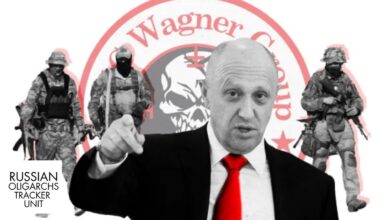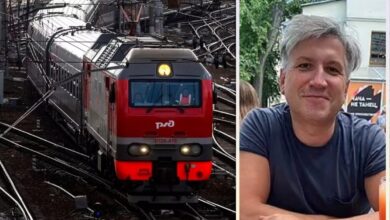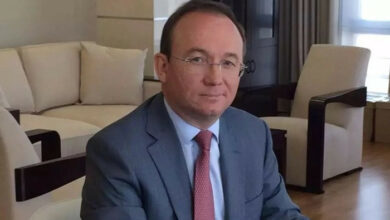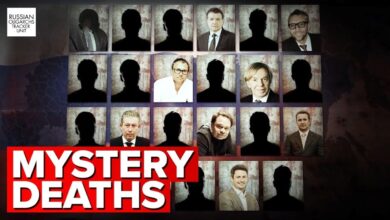Russian Banker Kristina Baikova, 28, Falls to Her Death from Moscow Apartment Window
Russian banker Kristina Baikova, at the age of 28, held the position of Vice President at Loko-Bank, a versatile commercial bank situated in Moscow. Prior to her tenure at Loko-Bank, she was employed at Moscow Credit Bank (MCB).
About Kristina Baikova
Russian Banker Kristina Baikova pursued her education in civil law at the Omsk Law Academy from 2011 to 2017. During her academic journey, her primary focus was on the study of legal principles and concepts.
In addition to her academic pursuits, Kristina demonstrated her dedication to the field of law by undertaking various professional roles. One of her significant experiences was as a Chief Client Manager at VTB, where she worked diligently from January to May 2016. In this role, she was responsible for managing and catering to the needs of important clients, showcasing her interpersonal and client relationship skills.
Starting in June 2016, Kristina transitioned into the role of Project Manager at the Moscow Credit Bank. This career move demonstrated her versatility and adaptability, as she assumed a position that required her to oversee and coordinate various projects within the banking sector. Her ability to take on such responsibilities speaks to her competence and willingness to explore new challenges in her professional journey.
How did Russian Banker Kristina Baikova die?
The 11th-floor apartment window in Moscow claimed the life of Russian Banker Kristina Baikova, a 28-year-old vice president of a Russian bank, in a tragic incident. This event adds to a series of mysterious fatal falls in the country, as reported.
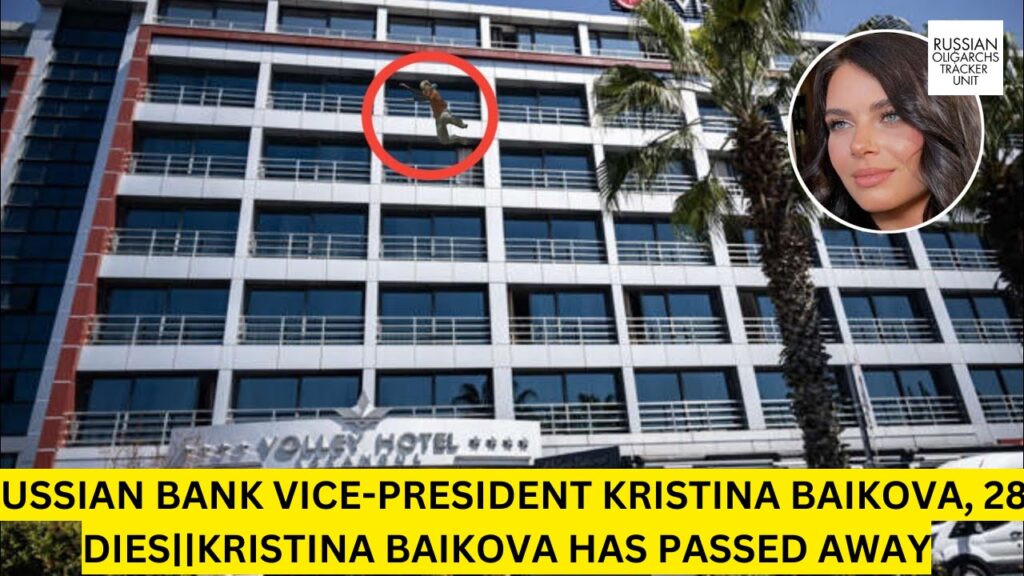
On June 23, Baikova fell from her apartment window and was declared deceased on the spot, as per information from the Baza Telegram channel.
At the time of her tragic fall, she was in the company of a 34-year-old male friend named Andrei, according to Baza’s report.
The man explained that Baikova had invited him to her apartment on Khodynsky Boulevard for some drinks, and she had gone out onto her balcony before the tragic accident occurred.
Baikova’s unfortunate demise is the latest in a concerning pattern of Russian executives meeting similar fates by falling from high-rise buildings.
When did Russian Banker Kristina Baikova die?
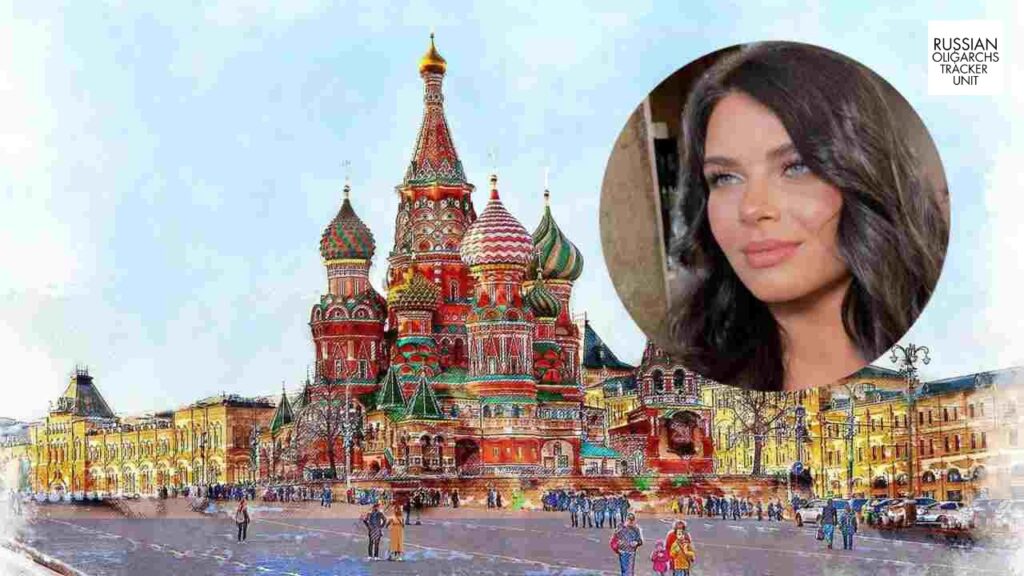
On June 29, 2023, it was disclosed that Kristina had passed away the prior week after a fall from a window in her Moscow apartment. Baikova, reportedly, had an accident where she fell from a window at her residence on Khodynsky Boulevard on Friday, June 23.
She was believed to have been in the company of a friend in her apartment during the early morning hours when the incident occurred.
Law enforcement was said to be actively investigating the circumstances surrounding her tragic demise.
Kristina’s friend was present in her eleventh-floor apartment at the time of her passing.
An inquiry has been initiated to investigate her demise.
Other deaths under suspicious circumstances have occurred since the commencement of Vladimir Putin’s Ukraine conflict. One such case involves the Russian defence official Marina Yankina, aged 58, who passed away in February this year after falling from an apartment window, similar to Ms. Baikova.
Ms. Yankina held a pivotal role as the head of the Ministry of Defense’s financial support department, responsible for funding the war effort. Her demise was initially reported as a potential suicide, a common occurrence in Russia when investigations are pending or when details are unclear.
In May, Russia’s deputy science minister, Pyotr Kucherenko, who was believed to be critical of the war, suddenly passed away after falling ill during a flight back to Moscow following a work trip in Cuba, as reported by the Mail Online. Although his family attributed his death to a heart condition, independent journalist Roman Super suggested that Kucherenko had privately expressed his inability to leave Russia before his demise.
In April, Igor Shkurko, the deputy general director of the Russian energy company Yakutskenergo, was discovered dead in his prison cell. The 49-year-old had been a member of the pro-Putin United Russia political party, but his membership had been suspended due to bribery allegations.
Two months prior, Viatcheslav Rovneiko, a 59-year-old Russian oil executive, was found unconscious late at night at his home and could not be saved by doctors, according to a report in the Moskovsky Komsomolets newspaper.
On December 26, Pavel Antonov, a wealthy sausage tycoon, local politician, and Putin critic, died in India after falling from a hotel window. Just four days earlier, his friend Vladimir Bidenov was found dead in the same hotel.
These are just a few examples of recent mysterious deaths involving prominent Russian figures
Mysterious Deaths Among Russian Elites Amid Ukraine Conflict
Wagner Group Leader Yevgeny Prigozhin’s Recent Death Sparks Concern
Yevgeny Prigozhin’s Tragic Plane Crash:
Yevgeny Prigozhin, the leader of the Wagner Group, met a tragic end in a plane crash while traveling between Moscow and Saint Petersburg. His death came shortly after a mutiny by his mercenaries in June, which strained his relationship with President Putin.
Speculation Surrounding Prigozhin’s Death:
Many speculate that Prigozhin’s death might be a political assassination, signaling a warning to Russia’s elites ahead of the 2024 elections. Ukrainian presidential aide Mykhailo Podolyak shares this sentiment.
Putin’s Response:
President Putin offered condolences and acknowledged Prigozhin’s contribution to fighting in Ukraine. He described Prigozhin as a complex figure with both achievements and mistakes. Several Russian elites have died under mysterious circumstances in the past year, raising concerns and conspiracy theories.
Deaths in Early 2022:
The string of unusual deaths began in early 2022, just before Putin’s invasion of Ukraine. Notable figures like Leonid Shulman, Alexander Tyulakov, Igor Nosov, and Mikhail Watford were among those who passed away.
Bizarre Deaths:
Some deaths took on bizarre and perplexing forms, such as Vasily Melnikov’s family stabbing and Vladislav Avayev’s murder-suicide. Alexander Subbotin’s death, involving a shaman and Jamaican voodoo rituals, stood out as particularly unusual.
Continued Deaths:
The pattern of elite deaths persisted into late 2022, with Pavel Antonov’s fatal fall from a hotel window in India. Several of these individuals had voiced criticism of Putin’s actions in Ukraine.
Despite these puzzling incidents, there is no clear and definitive explanation for these deaths. Many have noted the connection between the outspokenness of these elites and their unfortunate fates.
The death of Yevgeny Prigozhin, along with the string of mysterious deaths among Russian elites, remains a topic of intrigue and speculation, leaving many questions unanswered about the circumstances surrounding these individuals’ demises.
Other mysterious Russian deaths or attacks surrounding Putin
Boris Nemtsov
In 2015, Boris Nemtsov, a prominent Russian opposition figure known for his strong criticism of the Putin administration, was fatally shot in an assault that took place on a bridge within sight of the Kremlin.
- He met his demise just a few days prior to his scheduled leadership of an uncommon public demonstration against Russia’s takeover of Ukraine’s Crimean area and its backing of separatist activities in eastern Ukraine’s Donbas region.
- The Kremlin disavowed any participation, while in 2017, a Russian court found five individuals guilty of Nemtsov’s murder in a trial that his family labeled as an attempt to conceal the truth.
- In the years that followed, it came to light that a government agent working with a group that carried out assassinations had been closely watching him in the months before his death.
Alexei Navalny
The leader of the opposition, Navalny, who is currently incarcerated for approximately three decades, was poisoned in August 2020 using a potent nerve agent known as Novichok, a product of Soviet Union’s research and development.
- The Kremlin claimed no responsibility, but later inquiries conducted by Bellingcat revealed that the individuals behind the assault were affiliated with Russia’s Federal Security Service (FSB) and that the decision to poison him had come from the highest levels of the Kremlin.
Alexander Litvinenko:
In 2006, Litvinenko, a former KGB agent turned whistleblower, passed away in the United Kingdom as a result of poisoning with a scarce and extremely radioactive substance known as polonium-210.
- Once more, Russia has refused any participation, yet both the United Kingdom and the European Court of Human Rights have reached the conclusion that Russia likely played a role. The UK investigation even went as far as suggesting that Putin “likely sanctioned” the assassination of Litvinenko.
- One of the indications suggesting the Kremlin’s participation is the observation that nearly all the global supply of polonium-210 originates from state-managed nuclear facilities in Russia, where nuclear authorities have emphasized strict oversight over access to this element.
Sergei Skripal:
In 2018, Skripal, a former Russian intelligence operative residing in the United Kingdom, along with his daughter, fell victim to an assault in Salisbury. They were targeted with a nerve agent that bore a resemblance to the substance employed in the attack against Navalny.
- Skripal and his daughter managed to survive, but a British citizen lost their life, and several others were harmed when they encountered a perfume container suspected to be linked to the incident.
- The United States, the United Kingdom, and several other countries have jointly determined that individuals affiliated with the Russian military intelligence agency were responsible for the poisonings. Furthermore, the United Kingdom has formally accused three members of this agency in connection with the incidents.
Yuri Shchekochikhin:
In July 2003, Russian investigative journalist and liberal lawmaker Shchekochikhin experienced a sudden illness and passed away. Doctors at a hospital associated with the Kremlin stated at the time that his cause of death was attributed to a severe allergic reaction.
- His family members have reported that Shchekochikhin endured a harrowing 12-day period characterized by excruciating pain, during which his skin progressively peeled off, his hair fell out, and his organs suffered successive failures.
- When they requested access to Shchekochikhin’s medical records, medical professionals informed his family that these documents were being held by prosecutors, citing them as a “medical secret.” This was in relation to an investigation that would not be initiated until several years later.
- In the years leading up to his demise, Shchekochikhin had published investigative reports exposing a smuggling operation, money laundering activities, and a corruption scandal involving high-ranking FSB (Federal Security Service) agents.
- Additionally, he had been delving into the potential involvement of the FSB in the 1999 Moscow apartment bombings, an event that played a part in triggering the Second Chechen War.
Anna Politkovskaya
In October 2006, Anna Politkovskaya, a Russian journalist and advocate for human rights, was fatally shot in her residence located in Moscow.
- She had documented human rights abuses during the Second Chechen War and authored a book in 2004, asserting that Putin, via the FSB, was suppressing civil liberties to steer the nation toward a Soviet-style dictatorship before she passed away.
- In 2014, a Moscow court convicted five men for her murder, but the identity of the individual who ordered her assassination was never determined.
Multiple Russian oligarchs and executives also died :
According to a report from The New York Times, a number of prominent Russian oligarchs and high-ranking executives have met untimely deaths in perplexing circumstances, including suicides and accidents, since the commencement of Russia’s invasion of Ukraine.
- Ravil Maganov, who held the position of Chairman of the Board at Lukoil, a prominent Russian conglomerate, experienced a tragic and unexpected demise in September 2022. This unfortunate incident occurred when he fell from a hospital window in Moscow. The circumstances surrounding his death garnered significant attention and controversy in Russia and beyond.
- Russian media initially reported that Ravil Maganov had taken his own life, implying that it was a case of suicide. However, in response to these reports, Lukoil released an official statement following his passing. According to the company’s statement, Maganov did not succumb to suicide but rather passed away as a result of a severe illness.
The sudden and perplexing nature of Maganov’s death, along with the contrasting narratives presented by the media and Lukoil, added an extra layer of complexity to this tragic event. It raised questions and speculation within both the business community and the public, leaving many seeking further information and clarity about the circumstances surrounding the loss of a key figure in one of Russia’s largest private corporations.




